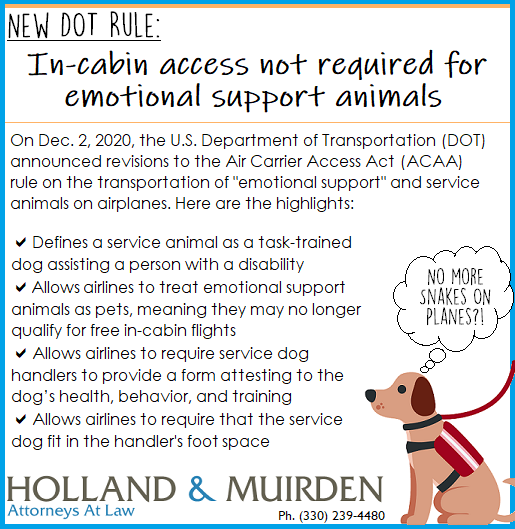
Yesterday, the U.S. Department of Transportation (DOT) announced revisions to the Air Carrier Access Act (ACAA) rule on the transportation of “emotional support” and service animals on airplanes. This decision comes after years of tension surrounding emotional support animals being allowed to fly in plane cabins for free.
Unlike service animals, there is no requirement that emotional support animals have any kind of training. There is also no restriction on the type of animal that provides emotional support, while service animals are dogs or, in limited cases, miniature horses. In recent years, individuals have attempted to bring a range of animals, including turtles, a pig, a squirrel, and even a peacock, onto flights as emotional support animals.
The new rule is in keeping with the Americans with Disabilities Act in that airlines can treat emotional support animals as pets and do not need to give such animals public access rights. Now, airlines must only allow task-trained service dogs to fly for free in plane cabins. Airlines are also permitted to require that the service dog fit within the handler’s foot space, which means they can preclude service miniature horses.
DOT also stood by its earlier decision that prohibits airlines from banning service animals who are of a certain breed. Delta currently bans pit bull service dogs.
Specifically, the new rule, which goes into effect in 30 days:
- Defines a service animal as a dog that is individually trained to do work or perform tasks for the benefit of a person with a disability (no longer requiring airlines to accommodate miniature horses, cats, rabbits, birds and all other “service animals” that airlines are currently required to transport);
- No longer considers an emotional support animal to be a service animal;
- Requires airlines to treat psychiatric service animals the same as other service animals;
- Allows airlines to require forms developed by DOT attesting to a service animal’s health, behavior and training, and if taking a long flight attesting that the service animal can either not relieve itself, or can relieve itself in a sanitary manner;
- Allows airlines to require individuals traveling with a service animal to provide the DOT service animal form(s) up to 48 hours in advance of the date of travel if the passenger’s reservation was made prior to that time;
- Prohibits airlines from requiring passengers with a disability who are traveling with a service animal to physically check-in at the airport instead of using the online check-in process;
- Allows airlines to require a person with a disability seeking to travel with a service animal to provide the DOT service animal form(s) at the passenger’s departure gate on the date of travel;
- Allows airlines to limit the number of service animals traveling with a single passenger with a disability to two service animals;
- Allows airlines to require a service animal to fit within its handler’s foot space on the aircraft;
- Allows airlines to require that service animals be harnessed, leashed, or tethered at all times in the airport and on the aircraft;
- Continues to allow airlines to refuse transportation to service animals that exhibit aggressive behavior and that pose a direct threat to the health or safety of others; and
- Continues to prohibit airlines from refusing to transport a service animal solely based on breed.
The full rule can be found here: https://www.transportation.gov/sites/dot.gov/files/2020-12/Service%20Animal%20Final%20Rule.pdf
And, as always, if you have questions about this new rule, consult an attorney.
Tags: air carrier access act, airline, emotional support animal, emotional support dog, flying with pets, service animals, service dog